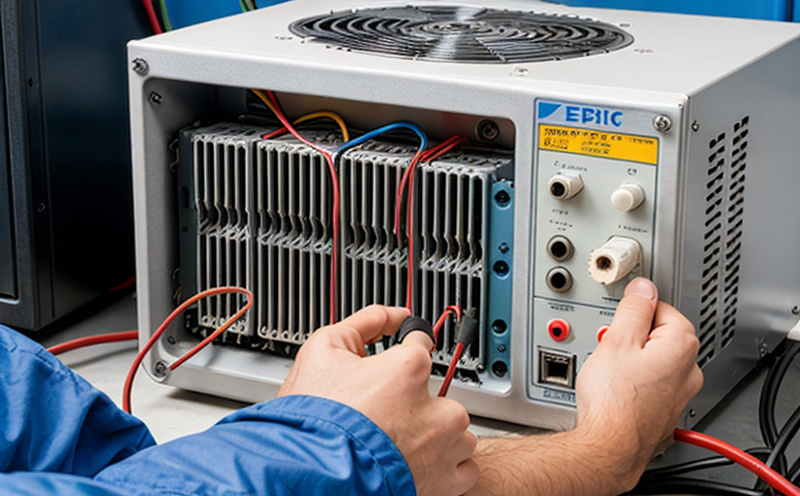IEC 62619 Battery Safety Testing for Marine Applications
The International Electrotechnical Commission (IEC) Standard IEC 62619 provides comprehensive safety guidelines for lithium-ion batteries used in marine environments. This standard ensures that battery systems meet stringent requirements to prevent hazards such as fire, explosion, and other risks associated with improper design or use.
The marine sector is highly regulated due to the critical nature of safety at sea. Battery failures can lead to catastrophic consequences, including fires, explosions, and environmental pollution. To address these concerns, IEC 62619 establishes a set of tests that are specifically tailored for the unique challenges faced by batteries in maritime applications.
The testing process under this standard involves multiple stages aimed at identifying potential safety issues early on. These include:
- Initial Screening Tests: This initial phase identifies any obvious defects or non-conformities that could compromise battery performance and safety.
- Thermal Stability Testing: This test evaluates the thermal stability of batteries under various conditions, ensuring they do not exhibit dangerous behavior such as overheating or runaway reactions.
- Electrochemical Compatibility Tests: These tests assess whether different battery cells can be safely combined in a single system without causing failures or safety risks.
- Overcharge and Overdischarge Testing: This ensures that batteries can withstand extreme charging and discharging conditions without damage.
- Vibration Testing: Simulates the harsh marine environment where equipment must endure significant vibration forces. This test evaluates how well the battery holds up under these conditions.
- Impact Testing: Tests how resilient a battery is to impact forces, which can occur during rough sea travel or accidents at sea.
- Water Resistance and Salt Spray Testing: Ensures that batteries are protected against water ingress and the corrosive effects of saltwater, which are significant concerns in marine applications.
The testing procedure outlined in IEC 62619 is designed to be rigorous yet practical, ensuring that only reliable and safe batteries find their way into maritime systems. Compliance with this standard not only enhances safety but also supports the reputation of manufacturers as industry leaders committed to quality and reliability.
Environmental and Sustainability Contributions
The implementation of IEC 62619 in marine applications contributes positively to both environmental sustainability and safety standards. By ensuring that batteries used in ships are safe, these tests help prevent accidents at sea which could lead to oil spills or other forms of pollution.
Furthermore, the standard encourages the use of renewable energy sources such as solar panels and wind turbines on board vessels, thereby reducing reliance on fossil fuels. This shift towards cleaner technologies aligns with global efforts aimed at combating climate change by minimizing carbon footprints associated with maritime transportation.
Competitive Advantage and Market Impact
- Increased Safety Reputation: Compliance with IEC 62619 enhances a company’s reputation as a leader in safety, making it easier to win contracts from discerning clients who prioritize security above all else.
- Better Consumer Trust: When consumers know that their chosen products meet stringent international standards like those set forth by IEC, they are more likely to trust the brand and recommend it to others.
- Premium Pricing Justification: Products conforming to such high standards often command premium prices because buyers recognize them as superior offerings worth paying extra for.
The adoption of this standard also provides a competitive edge by ensuring that companies remain ahead of regulatory changes and industry trends. As regulations evolve, those already compliant with IEC 62619 will be better positioned to adapt without disruption compared to competitors lagging behind in certification.
Use Cases and Application Examples
| Use Case | Description |
|---|---|
| Military Vessels | Batteries used in military ships must be extremely reliable. IEC 62619 ensures they meet the necessary standards for durability and safety under extreme conditions. |
| Cruise Ships | Cruises often travel through various climates, making it crucial that batteries are robust enough to handle diverse weather patterns while maintaining peak performance. |
| Container Ships | The large size of container ships means their power systems need to be exceptionally efficient and reliable. IEC 62619 helps ensure these requirements are met. |
| Fishing Boats | Fishing boats frequently operate in harsh environments, where both the battery's strength and safety features must excel. |
| Yachts | For yachts, reliability is paramount. Ensuring that batteries meet IEC 62619 standards helps maintain a high level of performance and safety throughout extended voyages. |
- Cargo Ships: Cargo vessels carry significant cargo loads and require reliable power systems to ensure smooth operations. IEC 62619 ensures that the batteries used are up to this challenge.
- Polar Research Vessels: Operating in polar regions presents unique challenges, including extreme cold temperatures and long periods without sunlight. Batteries for these vessels must be specially designed to withstand such conditions while also meeting stringent safety requirements set by IEC 62619.





